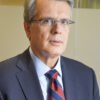Many knew it was coming, yet the Covid-19 pandemic imposed a rather violent shift to our daily routines. The current urban conditions for business and citizens alike are drastically different from what we were used to a mere year and a half ago—and optimists argue that this new reality presents opportunities for sustainable and purpose-driven growth towards societal prosperity.
In this issue of Business Partners, we have asked our Thought Leaders to discuss the shift we have been experiencing from a human-centric perspective to an inclusive collaboration between the state, city authorities, business, and civil society. In the following pages, they examine issues such as social resilience, diversity and inclusion from a corporate, government and civil society perspective in the post-pandemic urban scene, and look at key issues including urban mobility transformation and the changes to the urban natural environment, as well as to e-governance and tech life.

The Pursuit of Rosebud
By Pakis Papademetriou, Head, ESG Division, Eurobank
“I don’t think any word can explain a man’s life,” says one of the men wandering through the warehouse full of treasures left behind by Charles Foster Kane. But right then we see the word “Rosebud” on Kane’s childhood sled as it’s engulfed by the incinerator’s flames, a symbol of the childhood safety and hope one can spend a lifetime trying to regain. In Citizen Kane, it is clear to everyone what Rosebud is, but it is not clear what Rosebud means. The film is a testament to the short-lived vanity of our path, survived only by the impact we create in the roles we play.
Sustainability has always been about the generations ahead, about decisions made today affecting lives tomorrow. The decisions to listen, adapt, change and improve rather than stay the dead-end course are the imperative components of the realism dictated by the planetary and societal truth of our age.
The one thing certain about sustainability is the frenzied pace of its evolution
The pandemic changed the way we live, work, move and interact with each other, magnifying the focus on sustainability vulnerabilities, setting climate and development policies as the two sides of the same coin, a catalyst for systemic change towards a purpose of colossal proportions. These same sustainability vulnerabilities pose an astonishing business opportunity, driving the global alignment and the financial resources allocated.
The post-pandemic Next Generation EU era is all about recovery and resilience (RRF), with €750 billion channeled into a changing society over the coming years. It is through sustainable finance and impact investing that the world can pursue the better. The ESG side of the fiduciary duty reduces investment risk, responds to client expectations, gains reputational benefits, and improves financial returns.
The one thing certain about sustainability is the frenzied pace of its evolution. Alongside global efforts against climate change, previously neglected issues are becoming pressingly mainstream: biodiversity protection as a financially material priority refocuses the agenda towards nature positive outcomes; diversity and inclusion are evolving into strategic priorities for business worldwide; sustainable mobility is driven by the need for energy efficiency as well as the existential threat of overcrowded public transport amid a pandemic; remote learning and working are driving digitization as a crucial social priority—and the list is rapidly growing.
AmChamGR’s 19th annual CR Conference puts Citizen Sustain centerstage in building a better urban future. If sustainability is the Rosebud of our generation, we’d better make sure we know what it means for the impact we create in the roles we play.

Time to Commit to the Future
By Dimitris Agrafiotis, Manager M&A Project, Corporate and Government Affairs, Mondelez International
In this trying period, as our world deals with unprecedented challenges, businesses and brands have the power to bring people together and take a stand on important issues. Our responsibility as corporate citizens is to create local and global opportunities to further equity and economic and social empowerment by expanding diversity, equity and inclusion. We are confident that we all can make a true and meaningful impact over the short and long-term, driving positive, lasting and much-needed change on the issues of equity and inclusion. It’s time for all of us to pledge that DE&I is not just a declaration of intentions or an aspiration but a commitment that we should fulfill. To achieve that, the corporate world has to commit to a culture that embraces diversity, backs equity and champions inclusion.

A Resilient Future for All
By Rania Assariotaki, Senior Manager, Sustainability, Office of Public Affairs, The American College of Greece
What is the one lesson we should have already learned from the Covid-19 experience? What is the most heard word during this period? Resilience. We all talk about innovation, sustainable solutions, environmental protection, environmental justice, equity and diversity, wellbeing, health and safety. But what is the key to unlocking this potential? We must start by making SDG 17 our number one goal. Without collaboration and empathy, nothing is really going to change.
To make our society more resilient and sustainable for the current and future generations, all key actors must collaborate: The private and public sector, governments, NGOs, networks, fora, and academia. As a global community, we need to commit to connecting the dots and—through shared knowledge, empathy and a more species-egalitarian mindset—to safeguarding our planet for all living beings. Let’s believe in the power of many and let’s not throw away the key.

Embracing Social Responsibility
By Dimitra Daskalaki, Organizational Development and Communications Director, METRO SA
The era of the pandemic has already had a significant impact on how both business and people function within urban areas. During the lockdowns, the retail sector—as one of the very few industries that remained open—faced a critical dilemma: to continue its operations in a “business as usual” fashion or to use the crisis as an opportunity to adopt a more inclusive, sustainable, collaborative and socially responsible modus operandi.
In the endeavor to best serve the interests of society under these circumstances, METRO SA decided to support the initiatives of Be-Live, a new NGO that focuses on the demographic decline problem that Greece faces and helps young couples without the necessary financial means to overcome reproductive issues and have a child via free IVF treatments. Be-Live has already helped over 10 families across the country to have children.

Creating a New and Sustainable World of Work
By Chrysoula Diakatou, Head of Risesmart, Randstad Hellas
Recovery in the post-pandemic world requires a reorientation of business activities toward a sustainable and innovative digitally accelerated economy. Sustainable development goals such as decent work and economic growth, gender equality and quality education underpin an inclusive and prosperous labor market. Moving forward, we must strengthen employment by bridging the widening skills gap and fostering workplace innovation.
The shift to a hybrid work style presents a unique opportunity for a learning and skilling boom. Surveys show that development opportunities are not inclusive, and organizations that don’t encourage or require employees to participate in developmental initiatives are missing out on this opportunity. Businesses that prioritize democratized learning and development make a sustainable investment in engagement and retention and will benefit from developing an inclusive and agile workforce. Creating a sustainable world of work requires organizations to support their employees in developing a growth mindset and a learning culture.

SG Banking Products Enabling Urban Sustainability
By Dimitrios Dimopoulos, Head of ESG, Piraeus Financial Holdings
Today, 55% of the world’s population lives in urban areas, a proportion that is expected to increase by almost 70% by 2050. Climate change is the defining challenge of our time, posing an urgent threat to the lives and livelihoods of people across the globe. Making urban areas livable and sustainable is and will remain a pressing issue. The OECD and World Bank estimate that $7 trillion investment a year is required up to 2030 to meet climate and development objectives, but current spending on infrastructure is only around $4 trillion. Governments alone are constrained in filling the gap and private financing will be required. Financial institutions can contribute to financing new sustainable infrastructure, smart buildings and smart cities, and to addressing societal challenges such as aging populations, disadvantaged groups, health, and education. Creating an array of smart and ESG nuanced financial and core banking products will render financial institutions key players in making urban areas better to live in.

Change Is Happening—But Are We Ready?
By Ada Gianneskis, Communications Director Greece, Cyprus, Bulgaria, IKEA
The post-lockdown social mindset seems to linger in limbo—especially when the discussion focuses on heavily populated urban areas—ricocheting from collective joy to preemptive caution in the light of new Covid-19 mutations. Mixed feelings also rule over the average digital experience. True, technology can bring us closer, yet more often than not it will do it in a heartless, clinical way.
It is in such a flux of feelings, attitudes, and circumstances that societies revisit such social issues as inclusion and diversity, on their path to the global post-Covid era. And while we don’t know yet which trends and social practices will stick around as part of the new way of life, the game-changing population to keep an eye on in the years ahead are the millennials, who along with Gen Zs are as resilient as none other and have been the driving force for social change for years. The question is, Is the world ready?

Embracing DEI in the Workplace
By Vasiliki Kapari, HR Manager, Wella Company
Implementing diversity, equity, and inclusion (DEI) in the workplace has been a top priority in the past year, coinciding with organizations’ need to become purpose-driven and incorporate socially conscious practices. For some, this was crucial to their growth plans (diversity ignites performance acceleration) and for others, it was a matter of compliance (i.e. meeting the quotas). But we cannot ignore the boiling urge around gender equity, LGBTQI+ issues, and representation of the underrepresented as a cultural swift around the globe. Generation Zers are a surge force for societies and businesses that want to reevaluate their cultures and redesign their brands and to properly address diversity issues with an eye to structural change. The Covid-19 crisis has forced us to acknowledge our freedoms and move ourselves towards greater authenticity, while automation, robotics, and artificial intelligence are already formulating the workplace landscape, making it vital to be firm on the diverse representation ensuring a fair and inclusive future for all.

Urban Culture Is Vital for Post Pandemic Sustainable Cities
By Martha Kesisoglou, Marketing and Sustainability Advisor
The Covid-19 pandemic and its successive lockdowns made us realize that the lack of social interaction and the consequent pause of collective cultural expression, grassroots or mainstream, negatively affects society in multiple ways. A vibrant and dynamic cultural life shapes the soul of each sustainable city and its citizens. To nurture and support it is directly related to the UN’s inclusive agenda, as it addresses the challenges of promoting wellbeing, equality, inclusion and mental health.
For our cities to be sustainable, we need social interaction and culture generation as much as we need key urban sustainability components such as green energy, natural environment preservation, acceleration of tech evolution, encouragement of building renovation and reuse.
As we gradually emerge from lockdown’s urban hibernation, cities bounce back with renewed resilience and energy, and we realize the paramount importance of urban culture for driving sustainability awareness and for connecting emotional wellbeing with societal growth. Urban culture is a boundless canvas for painting the ideals of our common future.

Will the Road to Recovery Lead to an Economy that's Revived or Reimagined?
By Kiara Konti, Associate Partner, Climate Change and Sustainability Services, EY Greece
If Europe’s “man on the moon” moment was the announcement of the Commission’s Green Deal in December 2019, we must brace for the aftermath of the COP26 UN Climate Change Conference, to be held in November 2021 in Glasgow, UK.
With the global momentum of the fight against climate change more promising than ever, we can only hope that action following COP26 will not only revive our planet but also push for a change in the way that economies and societies prosper.
Nations, societies, and businesses around the world must accelerate the pace of change before it is too late. The EY report on a European green recovery, commissioned by the European Climate Foundation, identifies numerous projects with a positive social and environmental impact that could be launched within two years if they were to receive funding—and there are much more to follow. The question remains: Will the road to recovery lead to an economy that’s revived or reimagined?

Brewing Change
By Marilena Kouidou, Partner, Cafe Femenino Grece & Cyprus
From seed to cup, coffee is a vast and complex global ecosystem of vital economic, social and cultural significance. Yet the coffee value chain’s environmental footprint is significantly negative. Coffee is one of the major crops contributing to tropical deforestation, its production is water intensive and only a fraction of the billions of disposable cups used every year to serve it is recyclable.
Given the projected 50-150% global increase in demand by 2050, the future of the coffee value chain depends urgently on integrating sustainability into every aspect of the supply chain: from improving conditions at origin to developing ecofriendly roasting machinery and recyclable packaging materials. However, the true question is whether the social meaning of coffee and its popularity can be used to promote sustainability among consumers, instigating social, political and environmental change.
Could meaningful consumption or a ’just cup’ contribute to a more sustainable, eco-friendly, ethical and inclusive, prosperous world? The answer is bold: It could and it should.

Sustainable Smart Mobility
By Panos Kouvalis, Tribe Leader, Mobility and Convenience Tribe, Interamerican
New technologies like autonomous driving and ADAS, evolving customer trends around seamless mobility-as-a-service solutions, stricter legislation on emissions as well shifting value chains in the motor industry are creating a new world with many opportunities but also challenges. The certainty is that mobility is changing drastically to improve the quality of life, in relation to the urban environment, health and safety of commuters. Modern daily commuting habits and the digital revolution in everyday life will be decisive factors in shaping these changes.
Aiming to make a quality difference in people’s lives, Interamerican actively supports, enables and promotes the adoption of smart and eco-friendly mobility. The first step was to offer insurance solutions for electric cars and bikes, which are readily available through our site and networks. Nevertheless, we went beyond insurance through collaborating with likeminded startups. Charging stations, urban micro-mobility and the use of telematics are the first pillars towards creating a seamless and sustainable mobility experience for people.

Working As One
By Alexia Macheras, Sustainable Retail & Corporate Communication Manager, AΒ Vassilopoulos
This past year, the world we live in has transformed in an unprecedented way. The pandemic created both a health and economic crisis. In our urbanized and globalized world, cities—and the companies operating within them—have been at the epicenter of all this.
Sustainable urbanization is important for the wellbeing of all. Well-planned and managed cities create value that can help improve quality of life and address key issues such as poverty, inequality, unemployment, and climate change.
At AB, we have implemented changes and found innovative solutions and new ways to meet customer and societal needs. We’ve learned to be adaptable and move forward. The pandemic has given us a legacy of experiences, and we are now implementing our development plan that will benefit our clients, partners and employees, as well as the cities in which we operate and the Greek economy as a whole. We must work together as one, as there is only one future—our common future.

Building a Better Urban Future
By Olga Manou, Corporate Communications and Sustainability Director, Loulis Mills
Realizing the importance of our daily choices, we must seek the point that touches on our responsibility as citizens of a society called upon to make collective reforms. From this perspective, personal responsibility requires being aware of the phenomenon of climate change and pursuing the most comprehensive information possible. We are at the beginning of a new era, one in which global challenges such as global warming, resource crises and food waste, as well as growing pollution have all added to the uncertainties of the world. We are faced with ever rising challenges and obstacles. Despite the emergence of new technologies, old business patterns persist and are becoming increasingly harmful to our economy and environment. We need urgent change. This can mean forming groups and communities that build on the collective awakening effort for an urban redesign. Through innovation we can stop destroying the environment and increase sustainability and development. Only then, we can create the future that we want.

Doing the Right Thing
By Melina Thomaidou, Communications and Patient Relations Manager, AbbVie
Are there any missing dots towards sustainability and societal prosperity in this fast-changing world under crisis and reevaluation? The dots that connect all ends are ensuring inclusiveness for all people and respecting the traits and characteristics that make each individual unique. In other words, diversity and inclusion! It is undeniable that both emerge as the most essential values in our interconnected society and business community since they nurture empowerment, respect, empathy, innovation—driving forces for any contemporary business and society looking towards the future.
For AbbVie, diversity and inclusion are a mindset. An effort to fight unconscious bias. A bold culture going beyond stereotypes and doing the right thing, for our society, our company, our own people, and for our patients to have access to innovative life-changing medicines. We will never stop stepping up for what we believe in, being a driving force for change for a sustainable future for all generations.

Empowering Potential
By Angelika Tzemou, BoD Member and Head of HR, Bayer Hellas AG
As a global company with leading businesses in health and nutrition, we address fundamental human needs that are essential for a sustainable and inclusive world. Bayer is committed to creating sustainable solutions while helping to take care of our planet, our people, and the communities where we live and work. Diversity and inclusion is a huge asset to our sustainability efforts and to creating influence, engaging employees, and driving meaningful change. Bayer is committed to fostering, cultivating and preserving a culture of inclusion and diversity. The collective sum of our individual differences, life experiences, knowledge, innovation, self-expression, unique capabilities, and talent that our employees invest in their work represents a significant part of not only our culture and reputation, but Bayer’s achievement as well. At Bayer, one can bring their authentic self to work and reach their fullest potential to achieve our vision of ‘Health for all, Hunger for none”.






